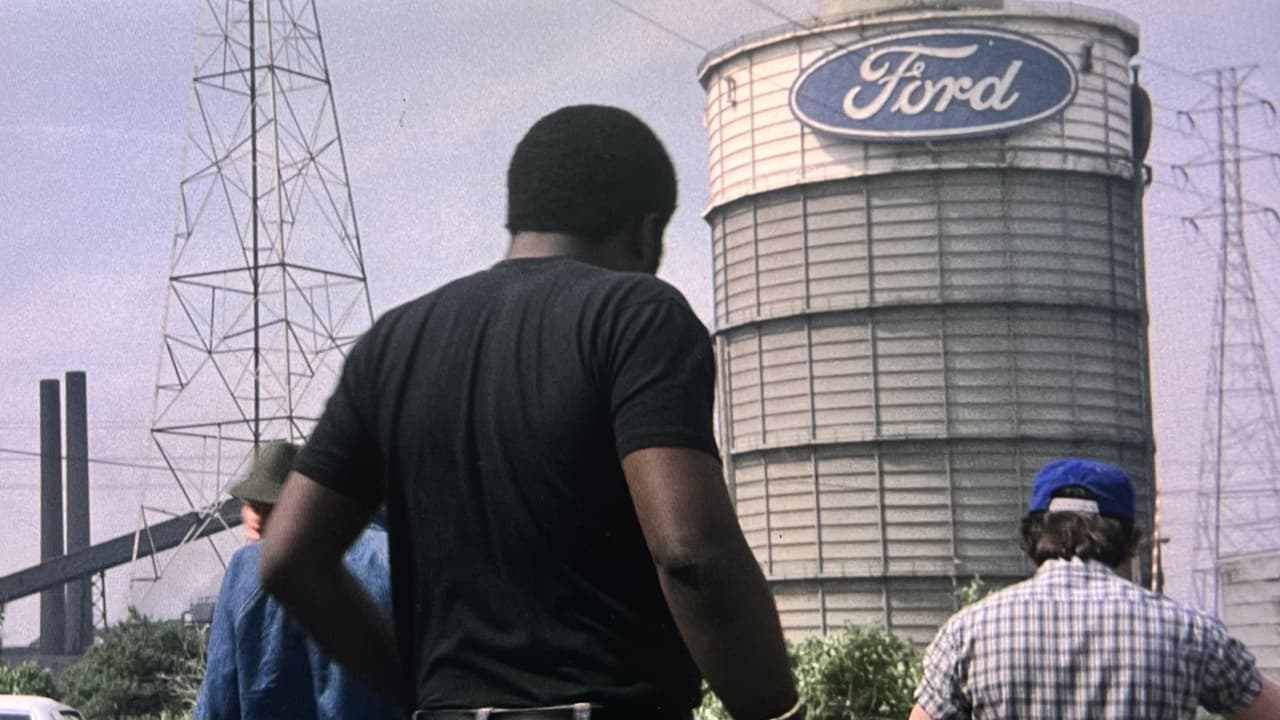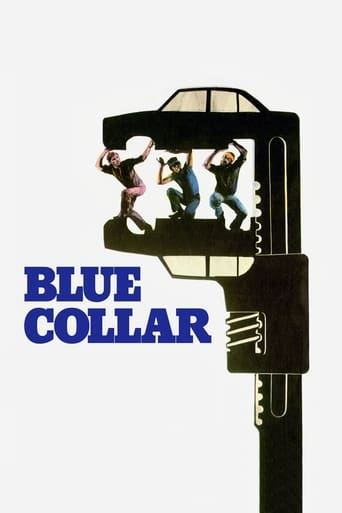



Sadly Over-hyped
I wanted to like it more than I actually did... But much of the humor totally escaped me and I walked out only mildly impressed.
View MoreAll of these films share one commonality, that being a kind of emotional center that humanizes a cast of monsters.
View MoreBlistering performances.
Blue Collar, Paul Schrader's first film, might not be easily identifiable as a Schrader film if you didn't know: for long stretches of time it almost feels like something arising organically from the factories and the surrounding community, particularly from the male workers who navigate between profane self-assertion and constant losing-battle economic anxiety. This doesn't mean it feels like documentary - it increasingly submits to the mechanics of the plot and to the journey toward its final cinema-fist freeze-frame - but much of the movie carries an enormous feeling of ease and almost unmediated expression, with all three lead actors as fine as they've ever been. The film explores the complex equilibrium of the worker - at once proud of the union and what it represents but mostly contemptuous of the specific individuals who embody it; adhering to a traditional role as head of household while constantly on the lookout to subvert it with drugs and available women; sensitive to criticism and accusations of fallibility while constantly aware of their circumscribed place in the system. It's a gripping film from beginning to end, but inevitably now it's the sociological aspect that holds sway, given the subsequent decline of such labour-heavy production methods, and its consequences for the kind of worldview and social infrastructure Schrader explores. The film's treatment of race is also notable: the film's protagonists - two black and one white - are joined by what they have in common without being suspicious of what they don't, until their unity poses a threat to the system, and so must be not just broken, but converted into active hatred. That ending freeze-frame isn't subtle, but watching the movie now, it's like a portal to the toxic present, in which such communities are plundered for easy votes, with never a shred of economic concession or compassion given in return.
View MoreBlue Collar is a criminally under rated classic from writer/director Paul Schrader. This is in my opinion one of his finest works. This is a very compelling and gritty drama with powerhouse performances from Harvey Keitel, Yaphet Kotto and Richard Pryor. This film is much about the struggles of the working man and a look at American society at the time. The film holds up well and much of the themes of the film are relevant today. Very well written and shot, the story flows well and the dialogue and performances are top notch. While the film is about union corruption, it also is a very human story that shows some of the circumstances that corruption manifests itself. There also is commentary on race, class and other issues that are relevant in modern times as well. The film is pretty political and hits on all kinds of social issues, but is never preachy or pretentious and brings this to life in a very real and personal manner. Blue Collar is a very overlooked film that deserves more fanfare and a solid work of 70's cinema.
View MoreFollowing his screen writing credits on classics like Obsession and Taxi Driver, Paul Schrader would make his first foray behind the camera with the 1978 film Blue Collar. Spotlighting the exploitation of proletariat workers at the hands of powers at be, the film ranks among Schraeder's best and remains a quintessential piece of 1970's U.S. independent cinema.Blue Collar revolves around three workers at a Detroit auto plant; Zeke (Richard Pryor), Jerry (Harvey Keitel) and Smokey (Yaphet Kotto). Perpetually mistreated by their higher-ups and barely making enough money to feed their families, the film follows the group as they hatch a desperate plan to rob their union. Carrying through with the plan, the men end up stumbling upon evidence of behind-the- scenes corruption, setting the stage for the film's second half where the big wigs gradually take down each member of the group.Shot with an air of gritty realism, Blue Collar is a low budget drama with a Marxist message - powerfully channelling themes of race, class conflict and white collar crookedness. Though similar contemporaneous films have endured better in the annals of film history, Schraeder's debut remains an overlooked gem - one worthy of being dusted off and given a second look.
View More"Blue Collar" opens with a masterful title sequence which introduces us, quickly and effectively, to the harsh world our characters reside in and to the nature of the conditions in the factory they work in. The opening sequence is set to Jack Nitzsche's "Hard Workin' Man", introducing blues music to us right off the bat, music that not only makes up basically all of the music in this film but can be seen as a motif or even a character in the film. It's amazing how confident and mature Paul Schrader is as a director at this point. Of course, Schrader had already written the massively acclaimed "Taxi Driver" by 1978, but contrary to what one might expect it's his confident and sure handling of the pace and mood in "Blue Collar" that is truly the highlight of the film, not the screenplay penned by Paul and Leonard Schrader, granted the screenplay is in itself quite terrific. Schrader is already a mature director who understands the rhythm of a film.Going back to the use of music in this film, it isn't so much the score itself by Jack Nitzsche (which is, don't get me wrong, solid blues) that's impressive, it's Schrader's handling of the music and sound in general in this film that makes it work so well. First off, the choice to go with a blues score is inspired in itself, as the nature of the music so perfectly captures what these characters are going through. In addition, the score is most noticeable during scenes where the film appears to be commenting on the futility of the characters' struggle and the misery of what they're going through. Where many films would use music to 'enhance' big, dramatic scenes, Schrader's "Blue Collar" makes the wise decision to use it during low-key scenes. There are several scenes that don't feature any music at all, these being some of the more important scenes. Note the scene where Smokey gets trapped in the paint room, absolutely no music, just the cold sound of the machinery (expertly mixed, might I add), which is far creepier and more effective than any score could be at that point. Similar use of sound occurs a few minutes before the end when Harvey Keitel's character Jerry is being chased.The acting here is uniformly superb with Keitel possibly giving his best performance (or at least one of them), and Richard Pryor offering what must be recognized as one of the finest performances of the 70's by anyone. Really, who knew Pryor had this sort of skill when it comes to dramatic acting? Yapphet Koto, a beloved character actor, does a fine job in rounding out the cast for the main three characters. Again, Schrader must be credited for directing his actors so well. It's well-known, of course, that the three leads hated each other and actually broke out in fistfights between takes on occasion. Perhaps that created a sort of demented chemistry between them.The screenplay by Schrader and Schrader (Paul and Leonard) is a fine, fine piece of writing, sort of the daytime factory-worker version of the crude-yet-poetic "Taxi Driver" screenplay. Oddly enough, it's also the source of the few major flaws in this film, as it can come across as fairly heavy-handed in certain scenes. If there's one thing I'd definitely do differently with this film, it's the final shot, which would have been terrific had this been a comedy.All in all, a great film in its own right and especially impressive as a directorial debut from Schrader. Very memorable.9/10
View More